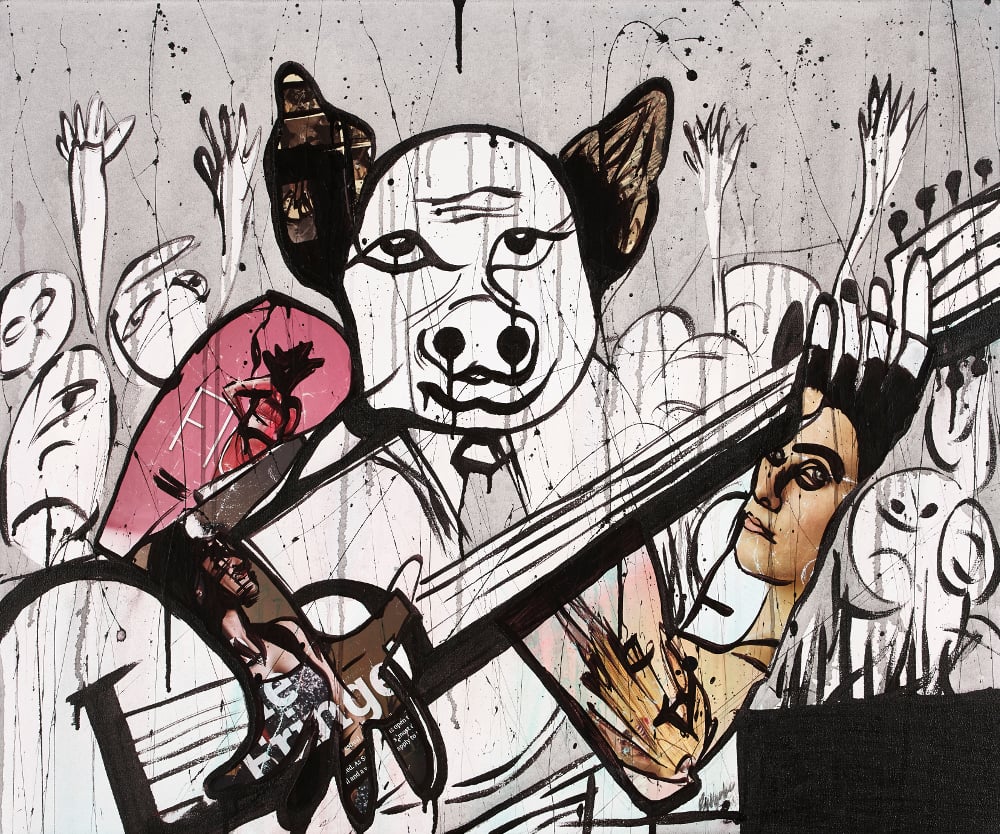With a feigned naiveté almost comical
The present is a congested space, filled with things running parallel, transverse and superimposed. This complex interplay somewhat defines what is often meant by contemporaneity. Blessing Ngobeni’s show As If You Care, is timeous in this sense, its large-scale mixed media paintings cutting across times, spaces, contexts and finding its voice through the palimpsest of references.
The title expresses a sense of despondency, if not exhaustion. The idea of caring, or lack thereof, speaks fundamentally to the disappearance of social ethics. Today, ethical expressions of care are embodied in narcissistic rituals of bourgeois humanitarianism. But as we learned from Oscar Wilde, altruism in a capitalist world is nothing but a bourgeois pastime that needs the poor to stroke its ego.
Ngobeni’s work might seem flamboyant, a little friendly, and even childlike from a distance. Its dazzling colours and melting figures lure us with their infantile innocence. His renditions vacillate from controlled, black-outlined figurines to chaotic works where colours are so full they seem to leak over the frame.
You wonder what is it about his work that is so familiar, yet beguiles us as if we’ve never seen it before. Ngobeni doesn’t just paint what he likes, but fearlessly appropriates what he likes. His work has the ability to converse visually with old masters and bygone times, cutting the distance and treating differing contexts as if they are part of dramatic explosions of related moments. Works such as Painting History and Q&A Unresolved Issues (Basquiat in my Son) tell us this.
With a feigned naiveté almost comical, Ngobeni’s work imprisons the viewer until the tipping point. From afar we assume one reality, but when confronted by the palimpsest of surfaces from cut-outs, pictures, texts or even found objects, other interesting realities unfold. The artist skillfully operates in a psychedelic way where, for example, an innocent bodily feature suddenly becomes an isolatable site, and where alternate narratives gets constructed. I wonder, though, about the prominence of lean white women, the model types, that always seem to vegetate in the background of most of his paintings.
Before arriving at one’s assumed content of the work, one is already been on a visual rollercoaster ride. The more we look, the more its childlike innocence peels off, and monstrous honesty takes over. With or even without his provocative titles, Ngobeni’s work has a persistent penchant for politically charged narratives. In paintings such as They Are All Criminals #LockThemAway, Bullfighter (capitalist) and Politician in Conflict, this is noticeable.

But Ngobeni’s idea of caring speaks not just to civil servants’ tactlessness but the general lack of care in society writ large. In Untouchable (politician), we see a familiar figure, with a notably bumpy head like that of our humorous head of state, flying above masses of people. The figure seems to be held up by invisible strings, as if it were a puppet precariously dangled above the ground. He’s waving and smiling.
But if he fell, he could be impaled on the prongs of forks, pangas et cetera, pointed upward by the angry crowds. The man is seduced by his apparent unreachability, but ignorant, careless even, of his own precarious position. We wonder what or who is outside the frame handling the strings.
In Dump Site, Ngobeni creates colourful world of objects and people seemingly piled on one another like heaps of waste. As if simulating the colour scheme of a waste site, he plays on the aesthetics of vulgarity and the cheapening of people’s lives on the one hand. On the other, optimistically, as if overlooking this abject state, the work suggests a sense of living that is vibrant and persistent in spite of everything.
It is as if life here speaks of beings excreted outside the world into a place that is at the same time not a place. These are the lives of those trapped at the bottom of the social hierarchy, souls who scavenge through the wreckage of life, existing in poverty and humiliation – reduced to non-beings.
Ngobeni’s images are attempting to bring us back to the reality – the forgotten world of the poor and the excluded. With municipal elections coming in 2016, hordes of politicians heaving under groceries will once again visit these “seeking ends” as Steve Biko would describe it. Here Ngobeni prompts not to just see superficiality of such care but it’s invested effort to deny justice and equality.
As If You Care shows at Gallery Momo in Cape Town until August 15.